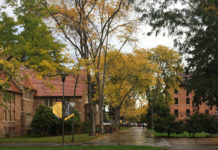By Angie Tinker, Matrix Co-Editor
What do the ALS Ice Bucket Challenge, the protests in Ferguson and the Ruth Anderson debate on vegetarianism all have in common? They’re all forms of advocacy.
The word advocacy comes from Latin roots meaning “to speak for.” This goes a long way in explaining how advocacy can take so many different forms, as people speak for the issues they care about, from topics such as healthcare, the environment, social justice, politics and more.
It’s even in Pacific Lutheran University’s mission statement, “[…] service, leadership, and care – for other people, for [student’s] communities, and for the earth.” Serving, leading and caring are all essential to being an advocate.
Small wonder, then, that PLU is full of advocates. One such person is junior Jenna Harmon, the president of the Grassroots Environmental Action Now (GREAN) club. GREAN has tackled a wide array of environmental issues, such as trying to stop coal port terminals and encouraging PLU to divest from fossil fuels.
Harmon sees the environment in all parts of life.
“I always try to think about my impacts personally on the environment and reduce those,” Harmon said. “I also try to educate others on ways to be more sustainable through GREAN, and the classes I’m taking will help me to work for environmental non-profits in the future and even this summer.”
Jumping into advocacy can be hard, though. One on-campus group, the PLU speech and debate team, is interested in helping students learn the skills they need for advocacy.
Calvin Horne is an assistant coach for the debate team. He believes debate can help people become better advocates for causes they are supporting by “challenging [your] beliefs, giving you the tools to effectively communicate [your] views and by encouraging a culture of sharing and entertaining a wide variety of beliefs and values.”
The debaters believe it. Sophomore Matthew Aust details one of the unique benefits of debate, arguing for positions you don’t agree with.
“It is important, if you want to persuade people, to acknowledge that alternative viewpoints are valid,” Aust said.
First-year Hannah Bates agrees. Arguing new topics and different sides each round has helped her expand her views.
“Debate has also simply educated me on global events,” Bates said. “Part of being an advocate for something is knowing about it and debate has given me the knowledge to better communicate my own ideas.”
You don’t have to be a debater to be an advocate, but it can’t hurt. In the end, it’s about bettering the world. As long as there’s value in life, we have a responsibility to advocate.
“[Advocacy] means, fighting for what you believe, generally for policy and through political leaders, but fighting for what you see as right,” Harmon said.






















